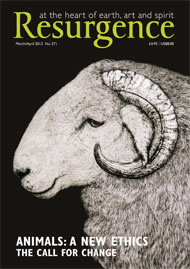Most animals today aren’t treated like animals at all. They are treated like inanimate objects, commodities, machines – anything but animals. On factory farms, their beaks and tails are cut off without so much as a painkiller; animals killed for fur are often skinned alive; and whole families of elephants and other animals are slaughtered so that the babies can be exported and kept in chains and cages for nothing more than human amusement.
Animals are being treated badly and killed painfully, but the issue of how they are treated is just as much about us – how we behave – as it is about them.
In 2005, I spoke about this at the International Nonviolence Conference in Bethlehem. My message, which is featured on the Audio CD Nonviolence Includes Animals, challenged the listeners – people who were totally committed to working for peace among humans – to confront their own most ingrained prejudices even as they challenged others to confront theirs. I asked them to take a hard look at whether their treatment of animals was truly nonviolent. The green movement faces a similar question of conscience: can we ever achieve environmental peace and justice if we ignore the plight of the Earth’s creatures?
Some people seem to think that our compassion is a limited commodity, like a cake with only a few slices. But it’s not. When Martin Luther King Jr., the great leader of the US civil rights movement, protested against US involvement in Vietnam, his followers admonished him and said that he should stay out of it, that it was a different issue. Dr King wisely replied, “Injustice anywhere is a threat to justice everywhere.”
We can make compassionate choices every day that will improve the lives of animals and humans as well as protect the Earth. For example, not eating meat – perhaps the greatest, simplest kindness that we can show our fellow animals – is also the single most important thing that anyone can do to save the planet. It takes 12,000 gallons of water to produce one pound of cattle flesh, and it takes 50 times as much water to raise a cow for meat as it does to raise the same amount of food from potatoes. It also takes almost twice as much fossil-fuel energy to produce the ingredients for a meat-based diet as for a plant-based one.
Choosing vegetarian meals also frees up more food for hungry people: it takes up to 16 pounds of grain to create just one pound of edible animal flesh. If we stopped intensively breeding farmed animals and grew crops to feed humans instead, we could easily feed everyone on the planet.
So why do we remain so biased against animals, so indifferent to their suffering? I believe this attitude is born of ignorance about animals, of a tremendous lack of understanding. In the days of slavery in the US, white people honestly believed that black African men did not feel pain as they did, that African women did not experience maternal love, and that therefore it was quite acceptable to brand men’s faces with a hot iron and to auction off slaves’ children. Educated people ignored their own eyes and ears and common sense because society accepted myths about – and the exploitation of – black people.
Today, we have thousands of examples of animals who demonstrate abstract thinking, complex communication, emotions, individuality and all the other characteristics once thought to be exclusively human. Dogs can learn many words from their human family’s language without even being taught. Ants create boats to cross streams; bats take food to neighbouring bats who are sick. Chimpanzees use tools. Octopuses learn how to open a jar just by watching a human do it. Monkeys will go hungry for days rather than deliver a painful shock to another monkey. Elephants cradle their dead relatives’ bones in their trunks, tears pouring down their faces.
As we cast about for ways to fix our planet’s mounting problems, perhaps it is time to look at the animal rights message with fresh eyes, to ask if we can open our hearts and minds and oppose injustice in all its unacceptable forms. We’re all free to make a start by wiping violence off our plates and treating animals like animals – breathing, thinking, feeling beings who, it turns out, aren’t so very different from us after all.






